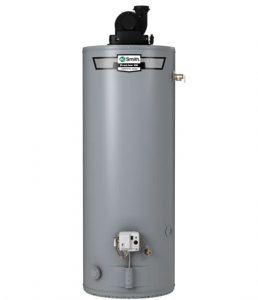Which type of person are you? The kind who takes a bracing hot shower to get pumped for work in the morning – or – the kind who likes to relax in a spa-style hot bath at night?
 Either way, you’re bound to be disappointed when you turn the tap and find your hot water is only lukewarm. There could be several reasons why you’re only getting lukewarm water, such as:
Either way, you’re bound to be disappointed when you turn the tap and find your hot water is only lukewarm. There could be several reasons why you’re only getting lukewarm water, such as:
- Your breaker has tripped
- Problems with your thermostat
- Mineral sediment is blocking the heating element
- Broken or malfunctioning immersion heater
- Broken dip tube
- Aging hot water heater
- Out of gas
- No power
- Low water supply
- Clogged pipes
Why is this happening, and how can I repair my water heater fast? Get this fixed before you’re left with no hot water at your home.
1. Your Breaker Has Tripped
Do you have an electric water heater instead of natural gas? If so, check for a tripped breaker that’s cut off the power supply to your hot water heater. (The water stored in the tank won’t turn freezing cold all of a sudden; instead, it will gradually cool from hot to lukewarm.)
Try resetting the breaker… and be prepared to wait, because it’ll take a while for that water to heat back up. If the breaker trips once again – or the water heater won’t switch back on – either your heater or your home electrical system likely needs repair.
2. There’s a Problem with Your Thermostat
A common reason why your hot water heater might not be working is a broken thermostat. First, check your thermostat to make sure it’s at the right temperature and no one has “helpfully” lowered the setting.
To test if the thermostat is working properly, turn the heat up and see if the heater actually turns on. If nothing happens, there’s likely an issue with the thermostat itself, and not with the temperature reading.
If the temperature is correct, the thermostat may have failed. Fortunately, that’s an inexpensive replacement. Since many tank hot water heaters actually have two thermostats, be sure that your Hot Water Ottawa technician replaces them both.
3. Mineral Sediment is Blocking the Heating Element
Minerals from your water supply often settle as sediment at the bottom of your hot water tank – exactly where the heating element is commonly located. This sediment build up tends to interfere with the heating process and keeps the water from being heated beyond the lukewarm stage. It can also cause your water heater to make popping sounds or the water to overheat, resulting in water that’s way too hot.
There are two possible solutions here. First, have your hot water tank drained once a year to flush out the sediment. Second, install a whole-house water softener to remove minerals from your home plumbing system.
4. One Immersion Heater is Not Doing its Job
Your hot water tank relies on a pair of immersion heaters to warm the water supply. If one of them malfunctions, the remaining heater will not be able to heat the water to your temperature setting. Instead, it will only be lukewarm.
Find a knowledgeable technician who can repair or replace the defective immersion heater.
5. The Dip Tube Has Broken
A small part with a big job, the dip tube channels cold water from your home plumbing pipes down toward the bottom of your water heater, to be warmed by the heating element. A damaged dip tube may simply deposit the incoming water near the top; from there, it will be piped back out to your home’s faucets before it has had a chance to heat thoroughly.
Because a broken dip tube generally cannot be fixed, you will most likely need to install a new water heater.
6. Your Water Heater is Getting Old
As your water heater nears the end of its service life (8-12 years for tanks and up to 20 years for tankless), its performance tends to decline. This means it simply won’t heat water as well as it used to. It’s best to get it replaced before your water heater stops working.
Now is the time to start shopping for a new, energy-efficient water heater as a replacement.
7. Out of Gas
If you rely on a gas-powered water heater, a common reason for cold or lukewarm water is simply running out of gas. Gas water heaters use a steady supply of natural gas or propane to heat the water. When the gas supply is depleted, the heating process comes to a halt.
To resolve this issue, you’ll need to contact your gas provider or supplier. They will schedule a refill or replacement of your gas tank, ensuring a consistent fuel source for your water heater. It’s advisable to keep track of your gas levels and have a system in place for timely refills to avoid interruptions in your hot water supply.
8. No Power
Electric water heaters rely on a continuous supply of electricity to function. If there’s a power outage in your area or if a circuit breaker trips, your water heater won’t be able to operate. This can lead to cold or lukewarm water coming out of your taps.
To address this, you’ll first want to check your circuit breaker panel to see if any switches have tripped. If that’s the case, simply reset the breaker. In the event of a power outage, you’ll need to wait until the electricity is restored before your water heater can resume heating.
If you know your hot water heater has power, but it’s still only supplying lukewarm water, it’s time to bring in a professional to take a look at any potential electrical problems your hot water system may have.
9. Low Water Supply
A decrease in hot water temperature can be attributed to a low water supply. This often occurs when there’s a leak in your plumbing system or if there’s simultaneous high demand for hot water, which may cause the hot water pressure to drop.
Inspect your plumbing for any visible leaks, paying close attention to joints, valves, and connections. If you find a leak, it’s crucial to address it promptly to prevent further water wastage and potential damage.
If there’s no leaks, you might just be using too much hot water at one time. Consider staggering hot water usage in your household to avoid overtaxing the system during peak times. If the problem persists, your household might just be too big for the hot water heater tank you’re using. It might be time for a bigger tank, or for a tankless water heater instead.
10. Clogged Pipe
A clogged pipe can obstruct the flow of water to your water heater, resulting in reduced hot water production. This issue is typically caused by a buildup of mineral deposits, sediment, or other debris in the pipes over time.
Regular maintenance is key to preventing clogged pipes. Flushing your water heater and conducting routine checks on your plumbing can help ensure a smooth and uninterrupted flow of hot water. Check different faucets and sinks to see if the problem is coming from one pipe, or from your whole system.
If you suspect a sediment build up, it’s advisable to consult a professional to assess the situation and take appropriate action.
Hot Water Ottawa Will Help
The name sums it up! Hot Water Ottawa is your source for expert hot water services in the Ottawa area. We offer reliable, professional hot water heater repair of any make or model – tank or tankless.
If you’re looking for a hot water heater replacement, talk to us about water heater purchase or rental. We’ll help you find the best option for your home.
